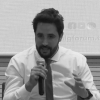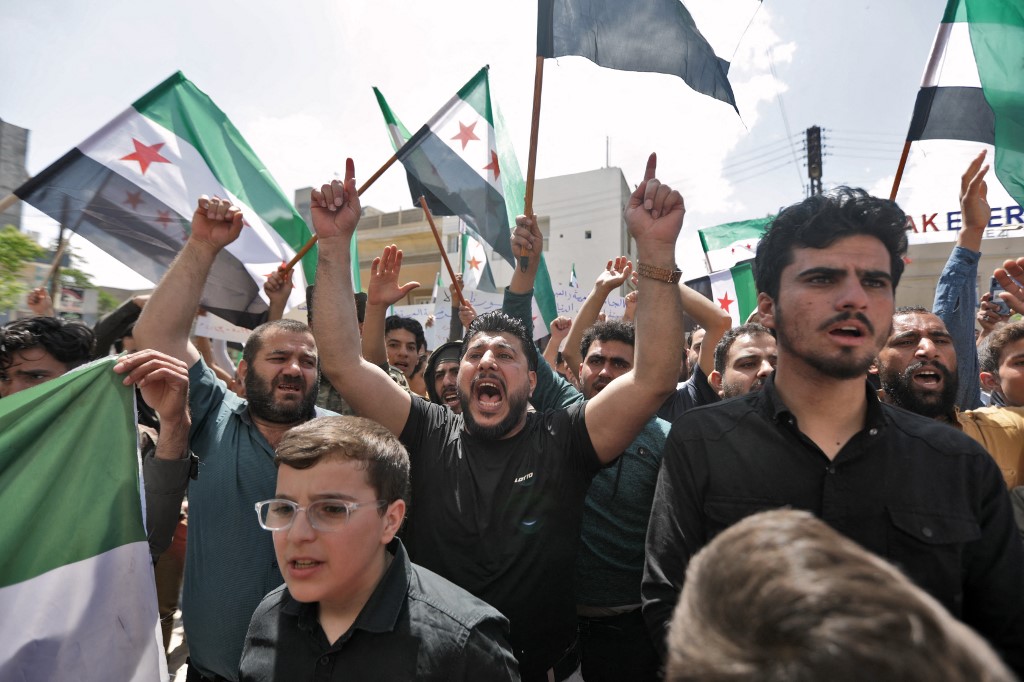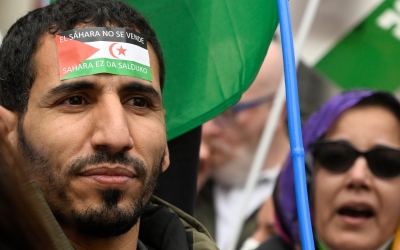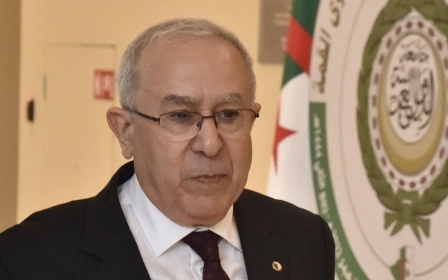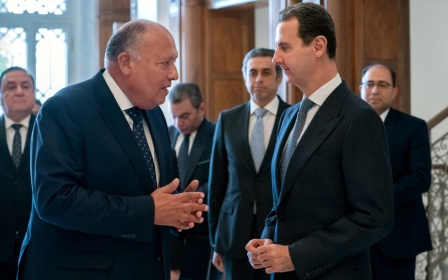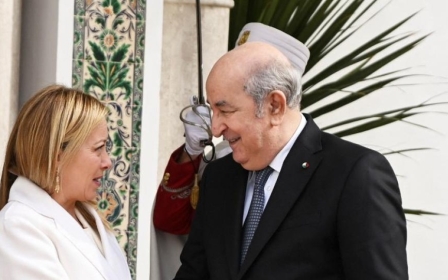Why Algeria's foreign policy should be more restrained
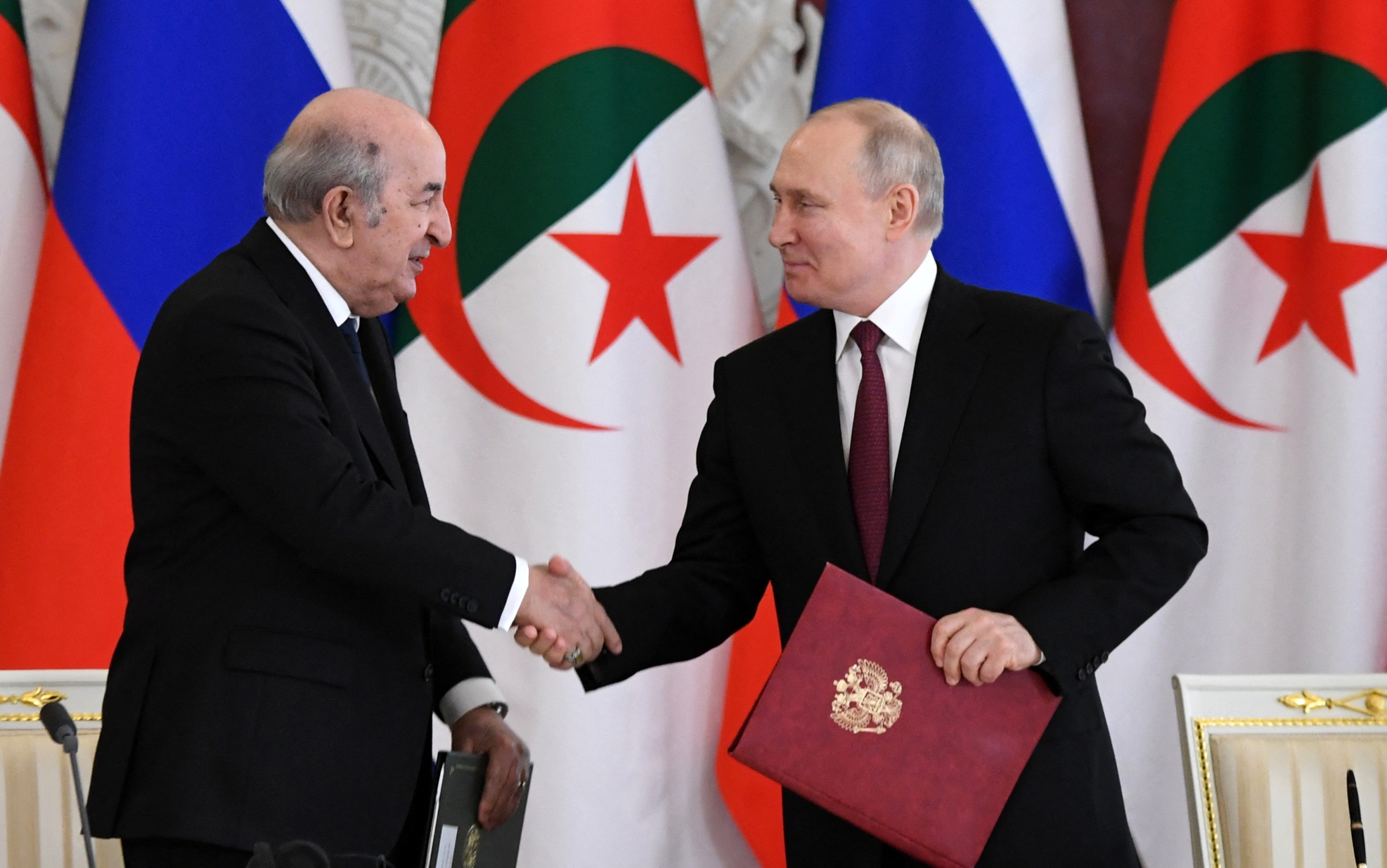
For years, observers have noted that Algerian foreign policy has been defined by a prudent strategy of rational realpolitik.
This was especially true during the Arab Spring, allowing the country to avoid the disarray that marked the period globally and maintain the state's survival when many of Algeria's neighbours were thrown into chaos.
In the face of increased regional and international polarisation over the past decade, the Algerian government demonstrated its diplomatic skills.
Regionally, it maintained a relatively equal distance between competing players, Turkey, Qatar, Saudi Arabia, UAE and Egypt.
Algeria has also enjoyed good relations with international rivals, the United States and European Union on one side and Russia and China on the other, in what has become a global dichotomy. Even at the height of the ongoing Russia-Ukraine war, Algeria did not align with one camp against the other.
New MEE newsletter: Jerusalem Dispatch
Sign up to get the latest insights and analysis on Israel-Palestine, alongside Turkey Unpacked and other MEE newsletters
Some may also point to the relative regional gains achieved in the last three years, in the era following the Hirak protests, with the country's active return and determination to play an influential role and fill the void that it left behind between 2013 and 2019.
But the tough tone featured in this remarkable return provoked high tensions between Algeria and some of its neighbours. Some foreign decisive actions include the recent three-day state visit of Algerian President Abdelmadjid Tebboune to Russia seeking to boost bilateral cooperation. Despite US outcry, Tebboune gave a defiant speech and negotiated military and economic deals amid the international crisis between Moscow and the West.
These recent developments have led observers to question why Algeria has adopted such an unusually assertive foreign policy, and whether it is heading towards a more offensive approach in contrast to its familiar prudent, defensive and more restrained one.
Certainly, continuing down this path would mark the end of long-standing Algeria's "wise realism" approach. A hyper-rational and less restrained foreign policy would tarnish Algeria's moral reputation due to reckless decision-making in a global environment that is increasingly polarised and unpredictable.
But how did the country reach this point and what should be done?
Weakened moral reputation
Last November, Algeria hosted the 31st Arab League Summit. The summit was postponed for several reasons, including divisions among Arab leaders on several issues, most notably the Syrian crisis.
While Algeria's support for the Palestinian cause since the 1970s earned the country a high moral reputation, its stance on Syria has weakened it
While some still oppose the return of Syria to the Arab League as long as the Assad regime is in power, Algeria has maintained its position of recognising the de facto political regimes as legitimate in countries experiencing civil wars, while working in parallel on constructive mediation between the conflicting parties within these countries, as it did with Syria after 2011.
Algeria's stances on the Syrian regime, in particular, and the Arab Spring protests in general have been criticised as dishonourable and a departure from Algeria's revolutionary history. Meanwhile, other observers, especially Algerians, have praised the government's position as "wise" and a "realist approach".
Regardless of public opinion, it seemed to Algeria's decision-makers that the time had come to settle the Syrian crisis, readmit Syria to the Arab League, and find a regional consensus formula that would pave the way for the local Syrian opponents to overcome this tragedy.
The Algerian efforts in this regard ended before the summit began, when some anti-Assad countries resolved to boycott Algeria's summit if Syrian President Bashar al-Assad would be a part of it. These pressures made Assad retreat and announce his non-participation in the summit so as not to obstruct Algeria's efforts.
Other issues Algeria wished to discuss with the Arab leaders are its national security, the Libyan war in its eastern flank, the Western Sahara crisis, Algeria's security concerns after Morocco concluded a normalisation deal with Israel under the auspices of former US President Donald Trump, in addition to the Palestinian cause that Algeria always places at the top of its priorities.
While Algeria's support for the Palestinian cause since the 1970s earned the country a high moral reputation in Arab and African spaces - and strengthened the legitimacy of its political discourse in regional and international institutions - its stance on Syria and approach of hyper-rational neutrality towards the Arab Spring over the past decade has weakened it.
It exposed Algeria's policy as less moral than what it was trying to demonstrate through political discourse, based on its historical legacy, making it appear as an extremely pragmatic actor, close to the disreputable Assad regime, especially since Algiers's attitude towards the Arab Spring is largely similar to the Syrian regime's.
Algeria has also enjoyed good relations with Assad's main allies, Russia and Iran, who are considered by a wide Arab mass and internationally as key actors responsible for deepening the tragedy of the Syrian people. Algeria has often been categorised by anti-Assad Arab media outlets as his supporter and has been pressured to condemn the regime and change what Algiers considers a neutral position on the Syrian crisis.
Furthermore, early American proclamations of support for the pro-democracy demonstrations across the Arab world in contrast to Algeria's position, which largely viewed the Arab Spring with suspicion, further undermined its moral image in recent years.
Although the US failed to meaningfully support democratisation efforts on the ground, the discourse of the Obama administration, and later, the Biden administration, included support for liberal democracy. The ideological struggle between democracies versus autocracies became the centre of these administrations' foreign policies.
This vision continues to dominate the Biden administration's foreign policy, which has adopted a liberal internationalist agenda, leading it to put more pressure on "non-democratic regimes" and changing them if possible, including Washington's "friendly regimes" in the MENA region.
Some of the major powers with which Algeria enjoys strategic relations, such as Russia and China, are lining up in the "camp of autocracies" or "rogue states", according to the US framing, and they are seeking to change the status quo of the US-led liberal international order. This also includes Algeria's historical friends such as Iran, Syria, Venezuela and Cuba.
All of these factors will likely place Algeria under additional international and regional pressure, which would impede its quest to return once again as an influential regional power. It may also undermine its future attempts to pursue a successful hedging strategy and cautious balancing at the international level and relegate the country to the "camp of dictatorships" with an assertive foreign policy away from democratic morals and norms.
An 'assertive' policy
Since Tebboune came to power in November 2019, tension has escalated between Algeria and its neighbour, Morocco, over the outstanding issue of Western Sahara, especially after the Guerguerat crisis in November 2020, and the Moroccan regime's normalisation deal with Israel under the auspices of Donald Trump in December 2020 and thereby Rabat's determination to settle the Western Sahara crisis by force. The tension reached its peak when Algiers broke off diplomatic relations with Rabat in August 2021.
In addition, tensions had escalated between Algeria and the Arab countries that support Khalifa Haftar in Libya, led by Egypt and the Emirates. Algeria has been sceptical of attempts to obstruct its diplomatic effort to solve the Libyan crisis in its eastern flank by those countries. Its position was further reflected in Tebboune's slogan: "Tripoli is a red line for Algeria".
It showed that the country is abandoning explicitly and unprecedentedly its non-interventionist and non-alignment policy towards the Libyan factions, and most importantly, its "silent diplomacy" that has worked in closed diplomatic corridors. Rather, it has moved toward a "louder" and more assertive diplomacy.
Algeria further demonstrated its assertive policy in its dealings with France and Spain. During the past three years, Algerian-French relations have witnessed clear tensions, especially with Algeria's insistence on settling the issue of historical memory and pushing France to recognise its historical crimes during the colonial era.
Moreover, Algeria officially adopted for the first time the English language in schools and universities as the first foreign language instead of French, which may be seen as an intentional restriction of the traditional cultural influence of Paris there.
Algiers also froze a number of economic and energy projects with France, citing its negative "interference" in internal and regional issues against Algeria's interests, especially in Western Sahara and the African Sahil crises.
Instead, Algeria has given trade-economic preference to other partners, such as Italy and Turkey.
Finally, Algeria's recent gas crisis with Spain has signalled its assertive policy shift. Due to the escalation of tension with Morocco, in October 2021, Algeria decided to shut off the Maghreb-Europe Pipeline, which supplies Spain with gas from lines that pass through Morocco.
The reasons cited by both the Algerian president and foreign affairs minister were the "hostile actions... conducted by the Kingdom of Morocco", referencing its Israel normalisation deal and the Western Sahara crisis.
Instead of this pipeline, Algeria decided to activate the maritime "Medgaz line" to transport gas directly to Spain, and from there to Europe.
However, in April 2022, Algeria threatened to turn off gas supplies to Spain because of what it considered "Spain's breach of the newly concluded agreement and terms", in which Spain pledged not to direct any Algerian gas to Morocco. The decision also followed Madrid's declaration of its support for the Moroccan position on Western Sahara.
Algeria's row with Spain came at a time when the latter, and Europe in general, was experiencing a severe energy crisis due to the war in Ukraine. This led to critics accusing Algeria of using the "gas card" like Russia to "blackmail" the EU.
Yet, Algeria's military readiness and arms deals with Russia support these critiques, so much so that a lobby formed within US Congress demanding sanctions on Algeria for its purchase of Russian weapons.
On the one hand, it is not objective to read into Algeria's assertive behaviour without applying the conventional realist wisdom: "If you want peace, prepare for war." Given the regional instability, potential external threats have kept the country on high military alert.
However, Algeria's gradual slide towards an escalation policy with less restraint will not enable it to navigate in a comfortable way, regionally and internationally, and will always make the country vulnerable to needless pressures.
This will not serve the country, especially at a time when it must urgently focus its efforts internally to address its economic and development challenges that will remain an obstacle to any attempt at playing an influential regional role. As the Americans say: "Foreign policy begins at home."
A 'hedging' policy
The task of restoring Algeria's influential regional role might push decision-makers to adopt a hyper-rational pragmatic approach and make them care less about norms.
Algiers is in a difficult position between western pressures and its historical strategic partnership with Moscow
However, Algeria should not ignore the serious international setting today with increased polarisation and the ongoing Russia-Ukraine war, which brought Europe to the brink of a severe energy crisis.
In Europe's hopes, Algeria - which is geographically close - would provide energy support in this crisis. This places Algiers in a more difficult position between western pressures and its historical strategic partnership with Moscow.
Therefore, restraint, hedging and caution are the most appropriate approaches in this critical situation.
The primary goal of any country's foreign policy is "to increase its security and prosperity without doing too much damage to its expressed political values". Since its independence, Algeria's values have been firmly rooted in a foreign policy doctrine that has given it a high reputation. It must be careful not to harm these values while seeking security.
Algeria's assertive policy during the past three years has proven beyond doubt its ability to safeguard its security and national interests when they are ignored by other actors. However, exercising less restraint in its policy may ultimately backfire.
In the coming years, Algeria should remind its neighbours of its ability to resolve crises and explain that its assertive policies were simply a temporary reaction to regional chaos and can be reversed as circumstances change.
Furthermore, Algeria will have to affirm its role as an active stabiliser for the region, as it has always been, and re-establish itself as a model of political realism, self-restraint and diplomacy. This will open the door to cooperation and building trust with northern Mediterranean countries like Spain, especially since Algiers's recent escalatory stance towards Madrid was due to North African troubles, nothing more.
In sum, Algeria needs to create a balance between its long-standing relationships with Russia and China without harming the prospect of its strategic partnership with the US and economic relations with the EU, as it successfully did between 1999-2010.
This is the essence of the hedging policy. Though it may be difficult for the country to adopt this strategy when global tensions are high, Algeria's geographical location, relatively far from the points of direct collision with the great power rivals, should enable its success.
But this means practising greater restraint and neutrality that may help the country escape the storm gathering around it due to strategic uncertainty and regional instability.
The views expressed in this article belong to the author and do not necessarily reflect the editorial policy of Middle East Eye.
This article is available in French on Middle East Eye French edition.
Middle East Eye delivers independent and unrivalled coverage and analysis of the Middle East, North Africa and beyond. To learn more about republishing this content and the associated fees, please fill out this form. More about MEE can be found here.


